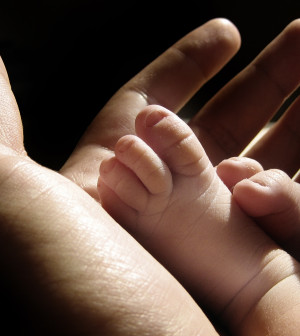- Could Your Grocery Store Meat Be Causing Recurring UTIs?
- Are You Making This Expensive Thermostat Error This Winter?
- Recognizing the Signs of Hypothyroidism
- 10 Strategies to Overcome Insomnia
- Could Artificial Sweeteners Be Aging the Brain Faster?
- Techniques for Soothing Your Nervous System
- Does the Water in Your House Smell Funny? Here’s Why
- Can a Daily Dose of Apple Cider Vinegar Actually Aid Weight Loss?
- 6 Health Beverages That Can Actually Spike Your Blood Sugar
- Treatment Options for Social Anxiety Disorder
Be Alert for PTSD After Pregnancy Loss

Post-traumatic stress disorder can develop in women after pregnancy loss, a new British study finds.
Women who suffer a miscarriage or ectopic pregnancy should be routinely screened for PTSD and receive mental health support, the researchers said.
“We were surprised at the high number of women who experienced symptoms of PTSD after early pregnancy loss,” said study lead author Jessica Farren, of the department of surgery and cancer at Imperial College London.
“At the moment, there is no routine follow-up appointment for women who have suffered a miscarriage or ectopic pregnancy,” Farren said. “We have checks in place for [postpartum] depression, but we don’t have anything in place for the trauma and depression following pregnancy loss,” she said in a college news release.
PTSD causes people to relive frightening or distressing events through nightmares, flashbacks, or intrusive thoughts or images. The symptoms can start weeks or even years after a traumatic event and can cause sleeping problems, anger and depression, the researchers explained in background notes.
“The symptoms that may be triggered can have a profound effect on all aspects of a woman’s everyday life, from her work to her relationships with friends and family,” Farren said.
For the study, the researchers surveyed 113 women who’d recently had a miscarriage (loss of a fetus before 24 weeks of pregnancy) or an ectopic pregnancy. In an ectopic pregnancy, the fertilized egg implants in the fallopian tubes outside the uterus. The pregnancy either miscarries or is ended with drugs or surgery.
Three months after their pregnancy loss, PTSD was reported by 45 percent of women who miscarried and 18 percent of those who had a tubal pregnancy.
Nearly one-third of the women said their PTSD symptoms had affected their work life, and about 40 percent said their relationships with friends and family had been affected, according to the study.
The results were published Nov. 2 in the journal BMJ Open.
The researchers said they’re planning larger follow-up studies.
Not all women who suffer a miscarriage or an ectopic pregnancy will go on to develop PTSD, said study senior author Tom Bourne, a professor at Imperial College London.
“Therefore, we are now investigating why some women may be more at risk than others, to help medical professionals identify who may need extra support,” he said.
More information
The U.S. Office on Women’s Health has more about pregnancy loss.
Source: HealthDay
Copyright © 2026 HealthDay. All rights reserved.










